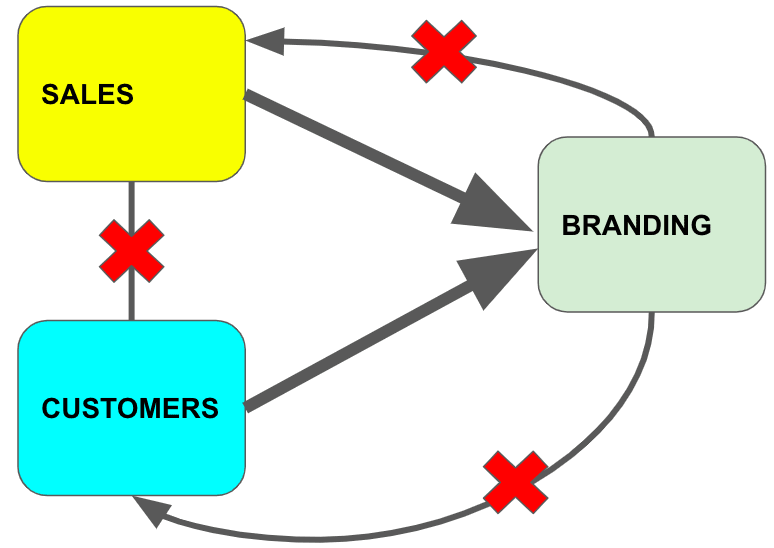In Nx monorepo (mono repository) workspace you can have applications(apps) and libraries(libs).
Apps mostly have projects that are front-end applications hosted on the server.
However, Libs should have the projects which should supporting your applications.Inside the Libs folder you can have your service projects. Within the Libs folder you can end up creating lots of projects and it is very confusing when every project can depend on every other project.
However, If you want to partition service code into well-defined cohesive blocks. Especially if you are following Service Oriented Architecture Advanced Distributed Systems Design by Udi Dahan. Then you might be aware that one service code should not depend on another service code. Therefore, you want to impose constraints on how projects can depend on each other in JavaScript Projects. Then it is very difficult if you don't use any framework. I would highly recommend using Nx Monorepo tag and scope.
Read this article till the end to learn more!
I have a project where I have Libraries
Branding folder that has couple of projects like logger, layout, angular material
Sales folder that has couple of projects product-editor and products
Customers folder that has couple of projects user-editor and users

I want to enforce below rules by Nx Monorepo Framework
- Sales projects can depend on Branding projects
- Sales projects should not depend on Customers projects
- Customers projects can depend on Branding projects
- Customers projects should not depend on Sales projects
- Branding projects can not depend on Sales projects
- Branding projects can not depend on Customers projects
Step1: Add Project's Tags in Nx.json
Go to nx.json and add projects tags.
"projects": {
"sales-product-editor": {
"tags": [
"scope:sales"
]
},
"sales-products": {
"tags": [
"scope:sales"
]
},
"customers-user-editor": {
"tags": [
"scope:customers"
]
},
"customers-users": {
"tags": [
"scope:customers"
]
},
"shared-ng-material": {
"tags": [
"scope:branding"
]
},
"shared-layout": {
"tags": [
"scope:branding"
]
},
"shared-logger": {
"tags": [
"scope:branding"
]
},
"onlinestore-client-e2e": {
"tags": [],
"implicitDependencies": [
"onlinestore-client"
]
},
"onlinestore-admin-e2e": {
"tags": [],
"implicitDependencies": [
"onlinestore-admin"
]
},
"onlinestore-client": {
"tags": [
"type:app",
"scope:client"
]
},
"onlinestore-admin": {
"tags": [
"type:app",
"scope:admin"
]
},
"onlinestore-client-e2e": {
"tags": [],
"implicitDependencies": [
"onlinestore-client"
]
},
"onlinestore-admin-e2e": {
"tags": [],
"implicitDependencies": [
"onlinestore-admin"
]
}
}
Step2: Add Enforcements in tslint.json file
Add below nx-enforce-module-boundaries array in tslint.json file.
"nx-enforce-module-boundaries": [
true,
{
"enforceBuildableLibDependency": true,
"allow": [],
"depConstraints": [
{
"sourceTag": "scope:sales",
"onlyDependOnLibsWithTags": [
"scope:sales",
"scope:branding"
]
},
{
"sourceTag": "scope:customers",
"onlyDependOnLibsWithTags": [
"scope:customers",
"scope:branding"
]
},
{
"sourceTag": "scope:branding",
"onlyDependOnLibsWithTags": [
"scope:branding"
]
}
]
}
],
Test the boundary constraint
Now if you go to sales-products.module.ts and perform below imports.
Remember the Rule for Sales Service: 👍
- Sales projects can depend on Branding projects
- Sales projects can depend on other Sales projects
- Sales projects should not depend on Customers projects
Lets Test the Sales Service boundary.
- 1. Try to import
SharedLoggerModulefrom branding scope and runnpm run affected:lintyou will not see any error.
// sales project
import { SharedLoggerModule } from '@myorg/shared/logger';
- 2. Try to import
CustomersUserEditorModulefrom Customers scope and runnpm run affected:lintyou will see any error.
// Sales project can not depend on Customers project
import { CustomersUserEditorModule } from '@myorg/customers-user-editor';
You will see below error:
> ng run sales-products:lint
Linting "sales-products"...
C:/Projects/GitHub/nx-repo/myorg/myorg/libs/sales/products/src/lib/sales-products.module.ts:9:1
ERROR: 9:1 nx-enforce-module-boundaries A project tagged
with "scope:sales" can only depend on libs tagged with "scope:sales", "scope:branding"
- 3. Try to import
SalesProductEditorModuleProject from sales service only and and runnpm run affected:lintyou will not see any error.
// Sales project can depend on other sales project
import { SalesProductEditorModule } from '@myorg/sales-product-editor';
Conclusion
So I loved the way Nx Monorepo framework gives the boundary constraints out of the box.
Become full stack developer 💻
If you want to become full stack developer and grow your carrier as new software developer or Lead Developer/Architect. Consider subscribing to our full stack development training programs. We have All-Access Monthly membership plans and you will get unlimited access to all of our video courses, slides, source code & Monthly video calls.
- Please subscribe to All-Access Membership PRO plan to access current and future angular, node.js and related courses.
- Please subscribe to All-Access Membership ELITE plan to get everything from PRO plan. Additionally, you will get access to monthly live Q&A video call with Rupesh and you can ask doubts/questions and get more help, tips and tricks.
You bright future is waiting for you so visit today FullstackMaster and allow me to help you to board on your dream software company as a Developer,Architect or Lead Engineer role.





Top comments (1)
Nice article it would help if there was an accompanying GitHub repo that showed a basic implementation of these ideas